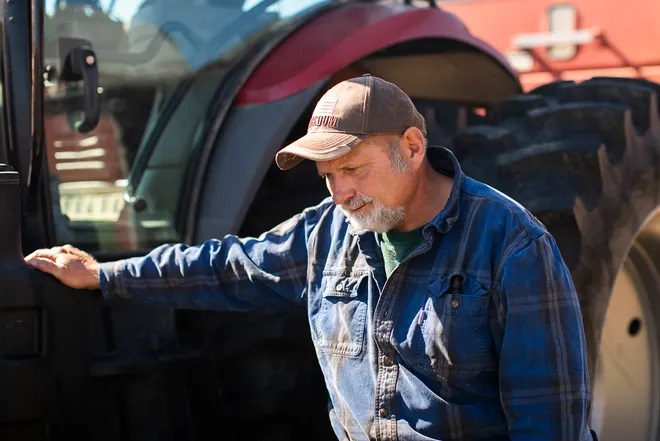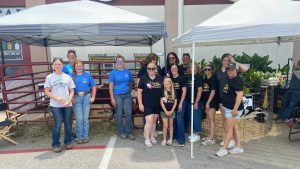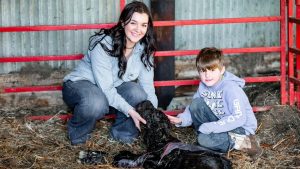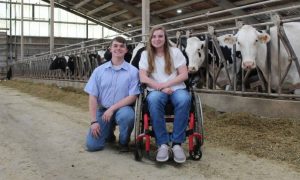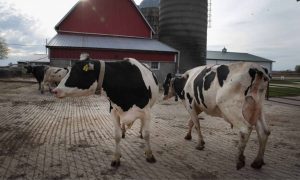
The following article describes suicide prevention, suicide and the impact of suicide loss. This content may be difficult for people who have experienced suicide loss or who are having thoughts of suicide. Please call 988 24 hours a day if you need assistance. Help is free and confidential.
Suicide and agriculture have gone hand-in-hand for longer than most farmers publicly admit.
“They have one of the highest rates of death by suicide,” said Ty Higgins of the Ohio Farm Bureau.
Males in the agriculture industry had a suicide death rate of 43.2 per 100,000 between 2010-17, compared to 27.4 for other occupations, according to a 2020 report from the Centers for Disease Control & Prevention.
Higgins learned that reality bluntly in the 1980s while growing up on his family’s dairy farm.
“We would sit around the table at supper and we would hear about a farmer taking his or her life, and that’s as far as the conversation went,” he explained. “The topic was talked about in whispers back then.”
But the Ohio Agricultural Mental Health Alliance has finally brought farm suicide awareness to the forefront, offering much-needed resources to farmers, farm families and rural communities.
‘A higher risk of death by suicide’
Stress and depression can be found in ag operations of all sizes across the Buckeye State, from micro farms to thousand-acre spreads.
“The average farm in Ohio is 170 acres,” Higgins said. “About 60 to 70% of farmers have off-farm jobs to supplement their farms.”
Most of them love what they do: delivering calves or piglets in the dead of a winter night, praying all summer for the right amount of rain, and always helping a neighbor even at the most inconvenient of times.
They may not have degrees or licensures, but they each have a lifetime of experience filling in 24 hours a day as their own veterinarians, mechanics, carpenters, meteorologists, biologists and economists.
“They do everything on the farm, including sitting in the cab of a tractor or combine for days at a time with just them and their thoughts,” Higgins said. “Sometimes that can put them in a bad place.”
Despite their seemingly limitless talents, farmers cannot be their own mental-health counselors. At times, that’s what they need more than anything else.
“Farmers simply don’t have control over the weather, the markets, something catastrophic happening on the farm or even family issues,” Higgins said. “There are so many factors that go into agriculture that puts farmers in a higher risk of death by suicide.”
‘We realized that we needed to do more’
The darkest season for many came in 2019. Endless rain had delayed planting, first by weeks, then by months. In the middle of June, a lot of farmers finally gave in and sowed their seed in thick mud. Some never planted.
“They were struggling,” Higgins said. “They weren’t sure what to do with themselves.”
The farm bureau that year joined with the Ohio Department of Agriculture and the Ohio State University to support the state’s farmers.
“As time went on, we realized that we needed to do more,” Higgins said.
The partners then created the Ohio Agricultural Mental Health Alliance, relying heavily upon advice from outside the ag community.
“We brought in the Ohio Department of Health, Ohio Department of Mental Health and Addiction Services and the Ohio Suicide Prevention Foundation,” Higgins said. “They really helped us see where we needed to go with this conversation.”
Member organizations have since grown to include Ohio Corn & Wheat, the Ohio AgriBusiness Association and Farm Credit Mid-America.
“It’s really come a long way at breaking down the stigma of mental health,” Higgins said. “We’re seeing farmers be a little bit more comfortable with hearing about mental health and farm stress and reaching out if they do have issues.”
‘It’s about that family’s legacy’
Growers, ranchers, dairymen and the like are often hard to reach because their anxieties are not rooted in making ends meet.
“For the farmer, it’s not just about their livelihood. It’s not just about bringing in money for the family,” Higgins said. “It’s about that family’s legacy, what weight that might carry if you come to a point where you begin to realize that you might be the one that ends that family legacy on the farm because of factors you have no control of.”
Hopelessness suffocates those who believe they are powerless to overcome life’s present obstacles.
“Farmers don’t realize that they’re so much more than their farm, that their value is not in dollars or acres or bushels,” Higgins said. “Their value is in their family: who they are as a father, as a a sister, as a grandparent. That’s their true value, and that’s what we’re hoping farmers see if they seek help.”
Resources are available 24/7 for those in crisis
Spring can be challenging each year. Portions of the last harvest sit unsold as commodity prices drop. Planting dates approach while input costs rise. Skies are cold and gray and wet.
“They’re not the only one going through what they’re going through,” Higgins said. “There are a lot of farmers that are struggling right now.”

In a small town, there’s concern that parking your truck outside a psychiatrist’s office will only spark rumors about the family name.
“There’s also an issue of pride in agriculture that they don’t need to go seek help, that they’ll take care of themselves like they take care of everything else on the farm,” Higgins said. “But this is a different ballgame. This is something that requires someone that can talk to you that understands what you’re going through.”
If the demons are at their strongest and it seems the only way out is permanent, dial 988 any time 24/7 to call an operator from the national crisis lifeline. Counselors there speak English and Spanish.
When things are a little more calm, farmers are encouraged to fill out an online ag stress survey at go.osu.edu/farmstresssurvey.
Responses will allow Ohioans to better help one another, Gov. Mike DeWine said in an Ohio Department of Agriculture news release.
“This survey will provide valuable help to numerous communities,” DeWine said. “I urge our farmers and beyond to answer these tough but necessary questions. You won’t only be helping yourself; you’ll be helping your family and friends.”
To read more about handling stress, farmers can visit three sites: u.osu.edu/farmstress, gotyourbackohio.org and farmstateofmind.org. Resources there are designed to connect those in need with the appropriate help.
Anyone who has an agricultural background and now works in mental health is encouraged to contact either the Ohio Department of Health or the Ohio Department of Mental Health and Addiction Services to see how they can help with the Ohio Agricultural Mental Health Alliance.
Friends, family and neighbors are all encouraged to keep an eye out for the state’s farmers and reach out to those who may be having a hard time.
“Get farmers to the help that they need as soon as they need it so we don’t have another tragedy on the farm like we’ve seen so many times over the past two years,” Higgins said. “Getting them to someone to talk to professionally is the hardest part.”
ztuggle@gannett.com
419-564-3508
You can now read the most important #news on #eDairyNews #Whatsapp channels!!!
🇺🇸 eDairy News INGLÊS: https://whatsapp.com/channel/0029VaKsjzGDTkJyIN6hcP1K
